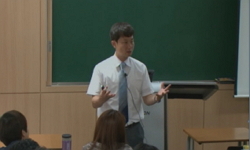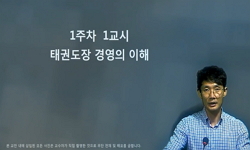The purpose of this study was to mark several categories such as, the Knowledge that Taekwondo Communication’s propriety claims(When doing Taekwondo, the event of a propositional truth, normative legitimacy, or subjective truth) can become a symboli...
http://chineseinput.net/에서 pinyin(병음)방식으로 중국어를 변환할 수 있습니다.
변환된 중국어를 복사하여 사용하시면 됩니다.
- 中文 을 입력하시려면 zhongwen을 입력하시고 space를누르시면됩니다.
- 北京 을 입력하시려면 beijing을 입력하시고 space를 누르시면 됩니다.
https://www.riss.kr/link?id=A100328592
- 저자
- 발행기관
- 학술지명
- 권호사항
-
발행연도
2014
-
작성언어
-
- 주제어
-
KDC
600
-
등재정보
KCI등재
-
자료형태
학술저널
- 발행기관 URL
-
수록면
59-69(11쪽)
-
KCI 피인용횟수
1
- DOI식별코드
- 제공처
-
0
상세조회 -
0
다운로드
부가정보
다국어 초록 (Multilingual Abstract)
The purpose of this study was to mark several categories such as, the Knowledge that Taekwondo Communication’s propriety claims(When doing Taekwondo, the event of a propositional truth, normative legitimacy, or subjective truth) can become a symbolic pattern through these speeches(sports media). We need to conduct even more detailed analysis on these remarks from two different perspectives; the justification on Taekwondo society(gymnasiums, stadium) and for people involved in taekwondo relations to something that the real world could use. Habermas’s communicative actions theory created a framework for this study and this was the result. First is the teleological action model, in which the speaker’s language on his own success, Taekwondo is one among several sports were it is influenced on opinion and other people in order to meet their interests. Second, is the normative behavior model where the language is seen as more sports pop culture that is supported by verbal agreement through Taekwondo. The mutual understanding and cultural traditions that will be inherited through actions. Such a view of cultural liberality should be more widespread in content-oriented linguistics rather than the interpretation of a result is called cultural ills in Sports cultural anthropology and Taekwondo. This is the dramatic act model. This language in the Taekwondo world is a self-reproduction of the core concepts, however, this does not call for voluntary act of expressions. With the audience in mind, a series of stylized representation of the experience can be associated with their performances. The dramatic act model is the primary occurrence in many sport phenomenology and is useful to describe the interactions, depending on the player and the environmental situation.
참고문헌 (Reference)
1 장춘익, "의사소통행위이론 II(기능주의적 이성 비판을 위하여)" 나남출판사 2006
2 장춘익, "의사소통행위이론 I(행위합리성과 사회합리화)" 나남출판사 2006
3 강병호, "물화(인정 이론적 탐구)" 나남출판사 2006
4 김정아, "감정자본주의(감정은 자본을 어떻게 활용하는가)" 돌베개 2013
5 Goffman, E., "Wir spielen alle Theater, Die Selbstdarstellung im Alltag" München 3-, 1969
6 Popper, K. R., "The Self and its Brain" New York, Heidelberg 38-, 1977
7 Popper, K. R, "The Philosophy of K. Popper, 제2권" La Salle, I11 1050-, 1974
8 Höffe, O., "Strategien der Humanität" München 77-, 1975
9 Luce, R. D., "Spieltheorie, und Sozialwissenschaften" Frankfurt/M., Heidelberg 1965
10 Ekeh, P. P., "Social Exchange Theory" London 1964
1 장춘익, "의사소통행위이론 II(기능주의적 이성 비판을 위하여)" 나남출판사 2006
2 장춘익, "의사소통행위이론 I(행위합리성과 사회합리화)" 나남출판사 2006
3 강병호, "물화(인정 이론적 탐구)" 나남출판사 2006
4 김정아, "감정자본주의(감정은 자본을 어떻게 활용하는가)" 돌베개 2013
5 Goffman, E., "Wir spielen alle Theater, Die Selbstdarstellung im Alltag" München 3-, 1969
6 Popper, K. R., "The Self and its Brain" New York, Heidelberg 38-, 1977
7 Popper, K. R, "The Philosophy of K. Popper, 제2권" La Salle, I11 1050-, 1974
8 Höffe, O., "Strategien der Humanität" München 77-, 1975
9 Luce, R. D., "Spieltheorie, und Sozialwissenschaften" Frankfurt/M., Heidelberg 1965
10 Ekeh, P. P., "Social Exchange Theory" London 1964
11 Honneth., "Pathologien des Sozialen, in: Honneth"
12 Popper, K. R., "Objective Erkenntnis" Heidelberg 123-, 1973
13 Harre, S., "Language and Human Nature" Carleton University 215-, 1972
14 Gaefgen, G., "Handlungstheorien, 제1권" München 249-, 1980
15 Bubner, R., "Handlung, Sprache und Vernunft" Frankfurt/M 66-, 1976
16 Sarbin, Th. R., "Handbook of Social Psychology, 제1권" Cambridge 223-258, 1954
17 I. C. Jarvie, "Die Logik der Gesellschaft" München 254-255, 1974
18 I. C. Jarvie., "Die Logik der Gesellschaft" München 227-, 1974
19 Hartmann, N., "Das Problem des geistigen Seins" Berlin 1932
20 Gerth, H., "Character and Social Structure" New York 1953
동일학술지(권/호) 다른 논문
-
유도 관련 학문적 연구동향 -석,박사 학위논문을 중심으로-
- 대한무도학회
- 정찬수 ( Chan Soo Jung )
- 2014
- KCI등재
-
한국유도 발달양상의 시대적 배경과 역사적 함의 -대한유도학교 창립 배경을 중심으로-
- 대한무도학회
- 송일훈 ( Il Hun Song )
- 2014
- KCI등재
-
- 대한무도학회
- 김영만 ( Yeong Man Kim )
- 2014
- KCI등재
-
사회문화 속에서의 무도정신과 체육정신(Athleticism)의 이해
- 대한무도학회
- 이정학 ( Jeong Hak Lee )
- 2014
- KCI등재
분석정보
인용정보 인용지수 설명보기
학술지 이력
| 연월일 | 이력구분 | 이력상세 | 등재구분 |
|---|---|---|---|
| 2022 | 평가예정 | 재인증평가 신청대상 (재인증) | |
| 2019-01-01 | 평가 | 등재학술지 유지 (계속평가) |  |
| 2016-01-01 | 평가 | 등재학술지 유지 (계속평가) |  |
| 2012-01-01 | 평가 | 등재학술지 선정 (등재후보2차) |  |
| 2011-01-01 | 평가 | 등재후보 1차 PASS (등재후보1차) |  |
| 2010-01-01 | 평가 | 등재후보 1차 FAIL (등재후보1차) |  |
| 2008-01-01 | 평가 | 등재후보학술지 선정 (신규평가) |  |
학술지 인용정보
| 기준연도 | WOS-KCI 통합IF(2년) | KCIF(2년) | KCIF(3년) |
|---|---|---|---|
| 2016 | 1.1 | 1.1 | 0.98 |
| KCIF(4년) | KCIF(5년) | 중심성지수(3년) | 즉시성지수 |
| 1 | 1.03 | 0.768 | 0.31 |




 KCI
KCI KISS
KISS






